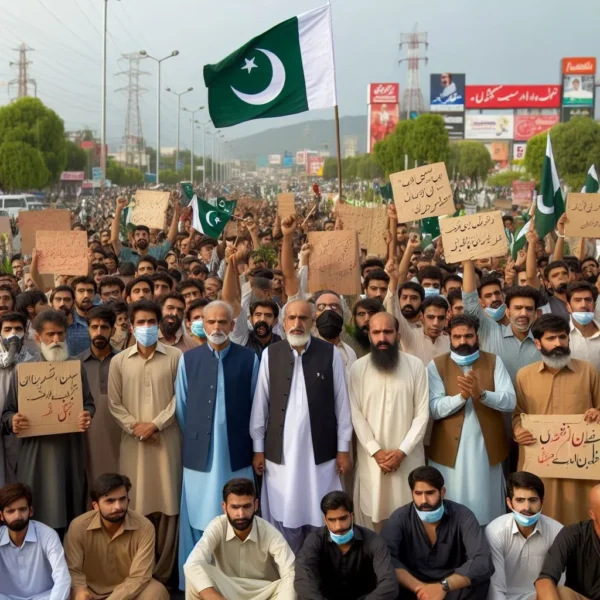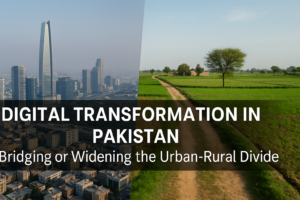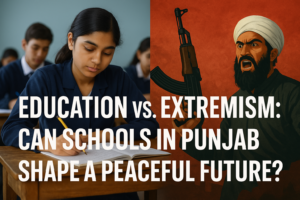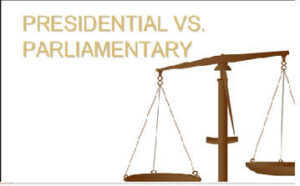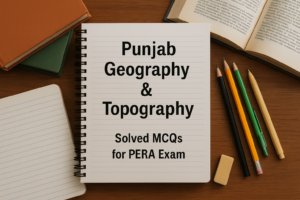Outline:
2. Introduction
Pakistan is not a failed state but a badly governed one. Good governance is the inevitable element of a state the absence of which deteriorates the public welfare. With measured reforms and institutionalization, governance can be made better in the country.
2. Crisis of Good Governance in Pakistan
- Sectors badly governed in Pakistan
- Institutions badly governed in Pakistan
3. Causes of Good-Governance Crisis
- Personalization rather than institutionalization
- Corruption and nepotism
- Ineffective short-term policies
- Wrongly set priorities
- Weak accountability
- Weak state governing institutions
- Political instability
4. Reforms and Institution Building
- Strengthening the state institutions
- Making the state institutions independent of undue influence
- Effective implementation of laws
- Empowering accountability and law-enforcing agencies
- Ensuring political stability and nurturing the healthy growth of democratic system
5. Contemporary Governance in Pakistan
6. Conclusion
What is Governance:
The notion of governance traces back to ancient human civilizations, with its etymology rooted in the Greek word meaning “to steer.” Essentially, governance encompasses the decision-making processes and their subsequent implementation or lack thereof. Good governance, therefore, entails the honest management of state affairs, characterized by adherence to established systems, unwavering commitment to meritocracy, meticulous adherence to rules, and equality before the law for all individuals.
Achieving good governance necessitates the presence of robust, independent public institutions that are attuned to the needs and aspirations of the populace. Governance is commonly understood as the exercise of economic, political, and administrative authority aimed at enhancing the overall quality of life for citizens. It is an ongoing endeavor marked by the accommodation of diverse opinions and aspirations, aimed at striking a balance between conflicting interests.
According to The Chartered Governance Institute:
Governance is a system that provides a framework for managing organisations. It identifies who can make decisions, who has the authority to act on behalf of the organisation and who is accountable for how an organisation and its people behave and perform.
Governance enables the management team and the board to run organisations legally, ethically, sustainably, and successfully, for the benefit of stakeholders, including shareholders, staff, clients and customers, and for the good of wider society.
What is Good Governance
“Good Governance” serves as a beacon for effective development strategies. Even the most crucial reforms in public expenditure can falter if the underlying accounting systems lack integrity, hindering the implementation and monitoring of budgetary policies. Similarly, flawed procurement systems can breed corruption and skew public investment priorities. This underscores a fundamental truth: good governance lies at the heart of fostering an environment conducive to robust and equitable development.
Governments wield significant influence in providing essential public goods. They set the regulatory framework that facilitates efficient market operations and intervene to rectify market failures.
Governance in Pakistan
Pakistan, a nation endowed with abundant resources and exceptional talent, finds itself mired in the quagmire of governance failures. Delving into the annals of its history since 1947, one uncovers a tumultuous narrative marked by a succession of diverse governance models, each tested under varying civil and military administrations. Good governance, the cornerstone of societal progress, encompasses the government’s ability to enhance the well-being of its citizens and the overall state. However, Pakistan has consistently grappled with a crisis of governance, characterized by systemic inefficiencies and a glaring absence of effective leadership.
Since its beginning, Pakistan has been focused on improving its institutions and skills to enhance the lives of its people. How well it’s doing can be seen in how well it’s governed. Unfortunately, Pakistan isn’t doing so well in this area, as shown by global reports on governance. To fix this, Pakistan needs to take a hard look at its policies and make them work better. Issues like safety, energy, money, politics, and getting along with each other are big problems that need smart solutions. We need to do better at stopping corruption, making sure people are responsible for their actions, and running things smoothly. To achieve good governance, Pakistan needs to promote honesty, teamwork, and make sure our economy stays strong while sticking to our plans. With everyone working together, we can overcome these challenges and make Pakistan a better place for everyone.
Central to understanding the crisis of governance are the core tenets of good governance, notably the promotion of public welfare and the robustness of state institutions. Regrettably, Pakistan’s governance deficit is starkly evident in the dismal state of public health, widespread illiteracy, and pervasive poverty plaguing the populace. Moreover, the erosion of state institutions and the mismanagement of key enterprises, exemplified by the demise of entities like Pakistan Steel Mills and Pakistan International Airlines, underscore the magnitude of the governance crisis.
The crisis is further exacerbated by the subversion of institutional integrity through personalization, corruption, and nepotism. During periods of military rule, state institutions were subjugated to the whims of dictatorial regimes, undermining the rule of law and exacerbating governance deficiencies. Moreover, the absence of coherent long-term policies, misplaced priorities, and a lack of accountability exacerbate the governance malaise.
To extricate Pakistan from the quagmire of governance failure, comprehensive reforms are imperative. Key among these reforms is the depersonalization of state institutions, ensuring their autonomy and insulation from undue influence. Strengthening accountability mechanisms and fostering harmonious civil-military relations are equally critical steps toward restoring governance efficacy.
Additionally, empowering law enforcement agencies, particularly the police, is essential for upholding the rule of law and restoring public trust. Furthermore, nurturing political stability and advancing democratic norms are indispensable for fostering a conducive environment for good governance to thrive.
While Pakistan’s journey towards good governance may be fraught with challenges, the burgeoning trend towards political stability and democratic consolidation offers a glimmer of hope. By steadfastly embracing democratic principles and instituting meaningful reforms, Pakistan can chart a course towards a brighter future characterized by effective governance and societal progress.
Crisis of Good Governance and Failure of Corruption Prevention in Pakistan
Corruption has reached alarming levels in Pakistan, yet efforts to enhance governance remain inadequate and inconsistent, leading to hindered progress and lost chances for development. Against the backdrop of the Panama Papers leak, both the ruling and opposition parties in Pakistan have levied serious corruption allegations against each other. The judiciary grapples with significant challenges in conducting impartial investigations, contending with various pressures from influential stakeholders, although it plays a crucial role in adjudicating on such matters. Massive corruption scandals of unprecedented magnitude frequently come to light, often exposing collusion between high-ranking political figures and the bureaucracy.
Unfortunately, perpetrators of large-scale corruption often escape adequate punishment due to the prevalence of widespread petty corruption within the government and judiciary. Law enforcement is faltering as corruption within the police force and lengthy court trials remain pervasive. In essence, influential, wealthy, and powerful individuals can evade accountability for their actions by paying the right price at the right time. Pakistan’s society tolerates general corruption, leading to a low Global Integrity Score. Despite having robust anti-corruption laws, their implementation fails to effectively curb corruption, as evidenced by global governance indicators.
The management of corruption ranks as Pakistan’s second weakest area of governance, trailing only behind counter-terrorism efforts. Any slight improvements in corruption management since 2010 have been overshadowed by a decline in the rule of law during the same period. The lack of active citizen participation poses a significant barrier to achieving high-quality governance in Pakistan. Many people are unaware of their participatory rights and consequently do not hold government officials accountable or exert pressure on them to uphold their lawful privileges.
In high-profile corruption cases such as the Foreign Funding Case, Tosha Khana, Malik Riaz Property case, and Qadir Trust, Imran Khan and his wife Bushra Bibi have refused to appear before courts and investigation agencies, employing delaying tactics with the judiciary’s cooperation. The courts have failed to effectively pursue legal proceedings against Imran Khan.
Law enforcement is a vital component of high-quality governance, ensuring equal opportunity in an independent state. It upholds individual rights and provides protection to minority groups within society, fostering neutrality and a fair administrative structure. Courts play a crucial role in implementing laws alongside police and prosecution departments, emphasizing the importance of judicial independence in a well-governed society.
However, the state of law enforcement has faced challenges and declined in effectiveness over time. While the Lawyers’ Movement in 2007 appeared promising, it lost momentum after the reinstatement of judges. Within the country, law enforcement has largely focused on traditional approaches to maintaining order and addressing security threats, overlooking fundamental principles such as transparency, accountability under the law, equitable and accessible legal processes, recognition and protection of essential individual rights, and impartial and accessible dispute resolution mechanisms.
SUGGESTIONS TO SET UP HIGH-QUALITY GOVERNANCE IN PAKISTAN
Authenticity:
A key aspect of high-quality governance is having a legitimate government, one that is elected through free and fair elections. An authoritarian or illegitimate government is detrimental to economic development. Therefore, ensuring that governance is based on democratic principles is essential for effective administration and societal progress.
Securing Human Rights:
Another crucial aspect of good governance is the protection of basic liberties. Law enforcement agencies may struggle to determine whether individuals are being subjected to death, torture, or degrading treatment while in custody. Therefore, it is imperative for a well-functioning administration to uphold and safeguard fundamental human rights, ensuring that all individuals are treated with dignity and respect, and that any instances of abuse are promptly addressed and prevented.
Law & Order:
Law and order ensure that all residents, regardless of their race, religion, sexual orientation, or political views, are treated equally under the law. Everyone has the right to equal legal protection and security, meaning that no one should be discriminated against or treated unfairly based on their personal characteristics or beliefs. Upholding law and order requires that justice is administered impartially and without bias, fostering a society where all individuals can live free from discrimination and fear of injustice.
Legal Executive Activism:
To improve high-quality governance, the top-level judicial system should proactively exercise its authority to safeguard individual freedoms and serve the public good. This means that the judiciary should be empowered to protect the rights and liberties of individuals, ensuring that justice is served and upholding the rule of law. By acting independently and responsibly, the judiciary can contribute significantly to enhancing governance and promoting a just and equitable society.
Decentralization: The responsibility for planning and executing improvement projects, as well as mobilizing resources, should be decentralized and delegated to various levels of local government. This approach empowers local authorities to address the specific needs and priorities of their communities, leading to more efficient and effective implementation of development initiatives. By involving local governments in decision-making and resource allocation, we can ensure that development efforts are tailored to local contexts and have a greater impact on improving the lives of citizens.
Straightforwardness: To establish good governance, states must prioritize transparency, ensuring that information is readily accessible to individuals. Transparency fosters trust between the government and its citizens, allowing for greater accountability and oversight of governmental activities. By providing easy access to information, governments can promote openness and empower citizens to participate in decision-making processes, ultimately leading to more effective and responsive governance.
Defilement Reduction: Corruption and good administration are incompatible. To combat corruption effectively, anti-corruption committees should be established with honest and courageous individuals to deter corrupt practices. These committees should have their own intelligence units to gather information about corruption, independent of relying solely on accusations. Additionally, media surveillance, including print and electronic media, along with an active civil society and vigilant opposition, can shape public opinion to hold those in power accountable and prevent the abuse of authority in accordance with the law and its advocates.
Regulatory Culture:
Clear and transparent norms for the recruitment, transfer, and promotion of government employees, coupled with legal protections for their responsibilities, can prevent their exploitation for partisan purposes. Ensuring fairness in the conduct of government employees is essential for fostering good governance in Pakistan. When public servants adhere to principles of fairness and integrity, it contributes to the overall effectiveness and legitimacy of the administration.
Responsibility:
Accountability is a hallmark of good governance, as it ensures transparency and oversight, thereby curbing corruption and preventing the misuse of state resources. By holding public officials accountable for their actions and decisions, accountability helps to promote integrity and efficiency within government institutions. It acts as a deterrent against corruption and excessive bureaucracy, fostering a culture of responsibility and responsiveness to the needs of the citizens.
Efficiency:
Productivity, an essential element of effective administration, is not solely dependent on external factors, but rather on factors such as proper recruitment, training, assignments, and promotions based on merit. By ensuring that individuals are recruited and trained effectively, and that tasks and promotions are assigned based on merit and performance, organizations can foster a culture of productivity and excellence. This approach helps to maximize efficiency and effectiveness within the administration, leading to better outcomes and improved service delivery for the public.
Political Culture:
Political culture plays a significant role in shaping good governance. The success of democracy depends on our actual behaviors and our political and social abilities. A healthy political culture fosters transparency, accountability, and the rule of law, all of which are essential for good governance. By promoting civic engagement, democratic values, and responsible political participation, a positive political culture can contribute to the effective functioning of government institutions and ensure the well-being of our nation.
Conclusion:
The crisis of good governance in Pakistan is a pressing issue that demands immediate attention. Reforms and institution building are essential to address the root causes and improve the overall governance framework. Active involvement of politicians, media, civil society, and citizens is crucial for creating a transparent, accountable, and responsive governance system. By implementing these recommended reforms, Pakistan can overcome its crisis of good governance and pave the way for a prosperous and inclusive future.
📍 SEO & Content Strategist | Expert in Current Affairs, History, Geography & Education Blogs | Digital Marketing Specialist
Muhammad Talha Mehmood is a seasoned digital marketing specialist, SEO expert, and content strategist with over six years of experience in creating high-impact, research-driven content. As the driving force behind Globaleak.com, he delivers in-depth articles on current affairs, history, geography, and education, helping readers stay informed with accurate, well-researched insights.
🔹 Expertise & Achievements:
✔ SEO & Content Strategy: Specializes in creating authoritative, high-ranking content that aligns with Google’s EEAT guidelines.
✔ Research & Analysis: Covers historical events, geopolitical trends, and educational topics with in-depth research and expert insights.
✔ Proven Track Record: Has successfully worked with global clients, delivering content that enhances brand trust, audience engagement, and search rankings.
✔ Academic Excellence: Holds an MBA in Marketing from IBA, University of the Punjab, and a B.Com (Hons) from Hailey College of Commerce.
✔ Industry Experience: Started his career with Packages Limited, trained under PITB’s E-Rozgar Program, and later became a Team Leader & Trainer at Emenac Group of Companies.
🚀 Passionate about creating impactful content, Muhammad Talha ensures every article is insightful, engaging, and value-driven.
📧 Email: talhamehmood34@gmail.com
🔗 LinkedIn: linkedin.com/in/talhamehmood-34

